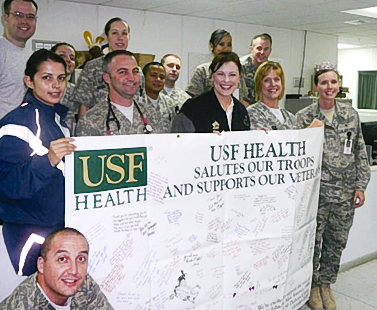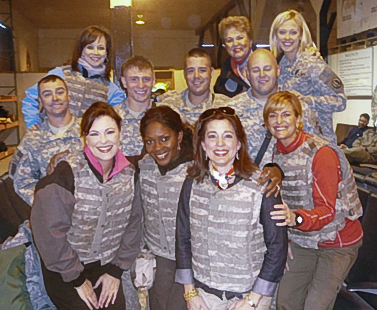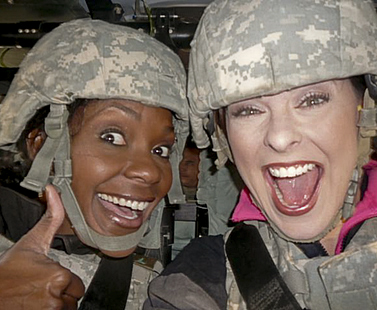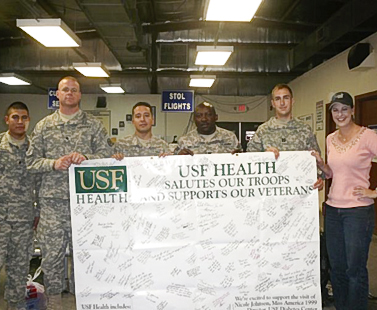USF's Nicole Johnson visits soldiers in Afghanistan
The plane began its descent suddenly, dropping thousands of feet and turning in a corkscrew pattern so tight that some passengers were sick.
The move was deliberate – a way for the military C-17 to evade ground fire as it landed in Bagram, Afghanistan.
It was just one more sign of the dangers that soldiers face every day – signs that USF’s Nicole Johnson saw firsthand a few weeks ago, as she went to visit the troops with a group of five other former Miss Americas.
“It changed my life,” said Johnson, Miss America 1999 and director of education, communication, and outreach for the USF Diabetes Center. “You see their struggle and what they’re giving up. They’re 20 years old, and they’re dying for us.”

USF’s Nicole Johnson, Miss America 1999, surrounded by soldiers in Afghanistan with a banner of well-wished from USF Health faculty, staff and students.
The group made the trip to boost morale among the soldiers and thank them for the work they do. Unlike traditional USO shows, the Miss Americas didn’t perform for crowds. Instead, their work was more personal. They listened to soldiers’ stories of home and families far away. They joked about the irony of beauty queens in flak jackets. And they cried with soldiers as they talked of comrades who had died.
“We’d just hug them, and say, ‘We love you, and we are here because we want you to know that,’ ” Johnson said. “It became that intense and emotional.”
The group spent the most time with soldiers who had been under heavy fire, often witnessing the deaths of their battle buddies. With little prompting, soldiers would pour out stories of loss and talk to the women about trying to cope with grief while standing guard in a lonely land.
“We would get back on the helicopters every night, and we’d just cry for about 30 minutes,” Johnson said. “It just still hurts, thinking about it – a kid that’s 20 or 21, they don’t deserve to have their lives cut short. And I don’t know how they deal with all the psychological turmoil.”

Nicole Johnson, front left, and five other Miss Americas visit with soldiers in Afghanistan.
The trip was physically demanding as well. In an effort to reach as many soldiers as possible, the women were up at 3 a.m. each day, often not returning to their temporary home – a wooden hut – until at least 10 pm. Reminders of danger were constant. They wore helmets and flak jackets, and a bomb shelter loomed just a few dozen feet from the hut. One helicopter crashed the day after Johnson rode in it. A village was bombed the day after the women visited.
But there were lighter moments too.
“I think we shocked the soldiers,” Johnson laughed.
Soldiers’ jaws would drop as they saw a platoon of beauty queens hit the ground and begin competing against each other to see who could do the most push-ups. The women invented a comic “Miss America formation,” starting by standing at attention and segueing into a series of hokey model poses.
The oldest in the group, Miss America 1948, Bebe Shopp, 80, told all the soldiers the same thing:
“You may not know my name – but your grandfathers did.”
The group flew first into Ali Al Salem Air Base in Kuwait, and spent nearly two days there. While the soldiers there are physically safer at that base, known as “The Rock,” than those on the front lines, Johnson said, it’s still difficult.
“It’s very safe, but desolate,” she said. “It was dirt, dust and more dirt. It was very depressing. There was nothing there to do.”
Visitors usually arrive there on their way to Iraq or Afghanistan, so soldiers based in Kuwait rarely interact with them. When Johnson and her companions did, they saw a universal response when they were introduced.
“It was a lot of joy,” she said. “Their faces would light up, and then their eyes would get big.”
Then she laughed.
“The sobering fact was, I was easily older, at 35, than almost everybody there.”

Ericka Dunlap, Miss America 2004, and USF’s Nicole Johnson, Miss America 1999, as their Blackhawk helicopter takes off.
As a public health doctoral student, Johnson was pleased to see health messages about hand-washing, flu prevention and dehydration everywhere she went. Soldiers couldn’t enter the cafeteria without washing their hands first.
“They really do so much better than we do at motivating people to practice good health and providing access to the right tools,” she said.
There were scarier signs too: one warned to be on the lookout for cobras.
In the midst of the bomb shelters and the unfamiliar terrain, reminders of home stood out. There was a Subway and a Pizza Hut. Soldiers had painted concrete construction barriers in bright colors to honor other military units and to memorialize Sept. 11.
When the women visited Bagram Hospital, where Johnson saw a boy injured by a bomb and scrubbed in to witness a surgery to help an Afghan man wounded by insurgents, Johnson took photos of the hospital beds. Each one was ready to receive injured soldiers, covered with a quilt sewn by American hands and marked by at least one letter written by anonymous American well-wishers.
Making the journey wasn’t an easy decision for Johnson. It meant a long separation from her 3-year-old daughter, Ava, and, since Johnson has type 1 diabetes, the possibility of health complications in a place with limited care.
Johnson was able to use Skype a few times during the trip to contact her family, but she wound up in a base hospital on the last night of her stay when her insulin pump backed up, sending her blood sugar level to a dangerous high. Because soldiers diagnosed with diabetes usually leave the Army, the base hospital did not have any insulin. Johnson had brought her own store of insulin, and was able to use the hospital’s syringes for an injection.
Still, even Johnson’s diabetes provided opportunities. She posed for a photo with one soldier holding her insulin pump high in the air. The soldier wanted to show his wife, who has diabetes, that even Miss America uses an insulin pump. Johnson also brought two banners from USF Health, signed by USF faculty, staff and students with messages of support for the soldiers. One banner is now displayed in Bagram Hospital; the other is in the terminal at Bargram Air Field.

Nicole Johnson also brought this USF Health banner to Afghanistan.
Johnson also brought five banners signed by children at her daughter’s school. They are now displayed at the various Afghanistan bases the women visited, including some in base churches.
Despite the hardships of the trip, Johnson has already volunteered to return.
“War doesn’t seem real to us here. I’m thankful to understand a little more about that reality,” she said. “We get so wrapped up our world and our lives, and we’re all spoiled. We all owe it to do more for the people who are sacrificing their lives – to do more to support them.”
— Story by Lisa Greene, USF Health Communications; Photos by Nicole Johnson, USF Diabetes Center

